Migration Law Assignment: Analysis of Partner Visa Regulations
VerifiedAdded on 2022/12/19
|6
|1460
|94
Report
AI Summary
This report analyzes a migration law assignment concerning partner visas in Australia, addressing several key issues. The first question examines the legality and ethics of a sponsorship arrangement where a person offers to marry another for a partner visa in exchange for payment. The second question delves into the relevant sections of the Migration Act 1958 (Cth) regarding genuine relationships, deception, and penalties for fraudulent visa applications. The third question discusses the implications of a changed relationship status on a temporary partner visa (subclass 820) and the required communication with the Department of Home Affairs. The fourth question considers the responsibilities of a registered migration agent under the Code of Conduct, particularly concerning advising a client about a potentially fraudulent visa application and the disclosure of confidential information. The report references relevant legislation, including the Migration Act 1958 (Cth) and the Migration Agents Regulations 1998, to support its analysis.
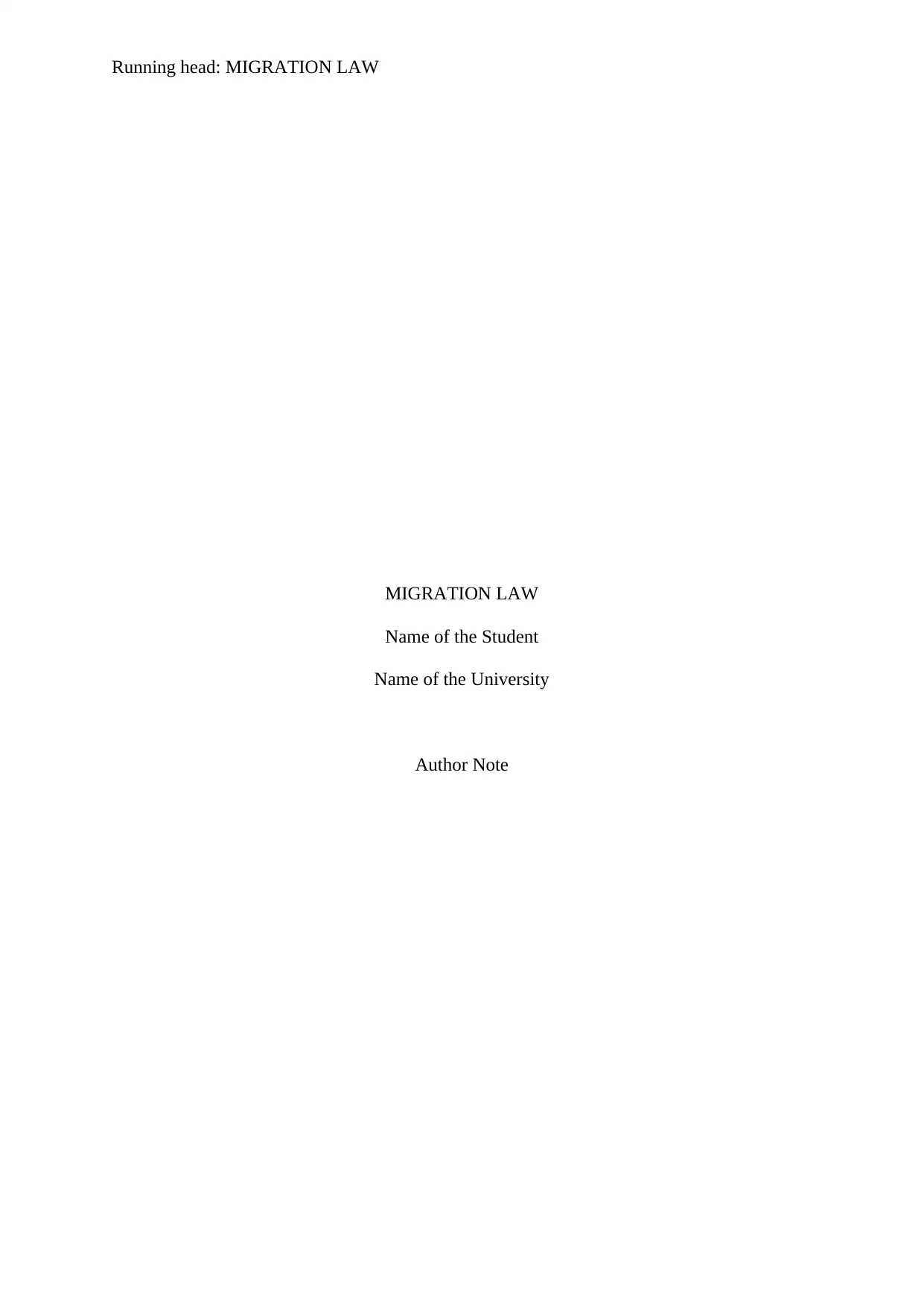
Running head: MIGRATION LAW
MIGRATION LAW
Name of the Student
Name of the University
Author Note
MIGRATION LAW
Name of the Student
Name of the University
Author Note
Paraphrase This Document
Need a fresh take? Get an instant paraphrase of this document with our AI Paraphraser
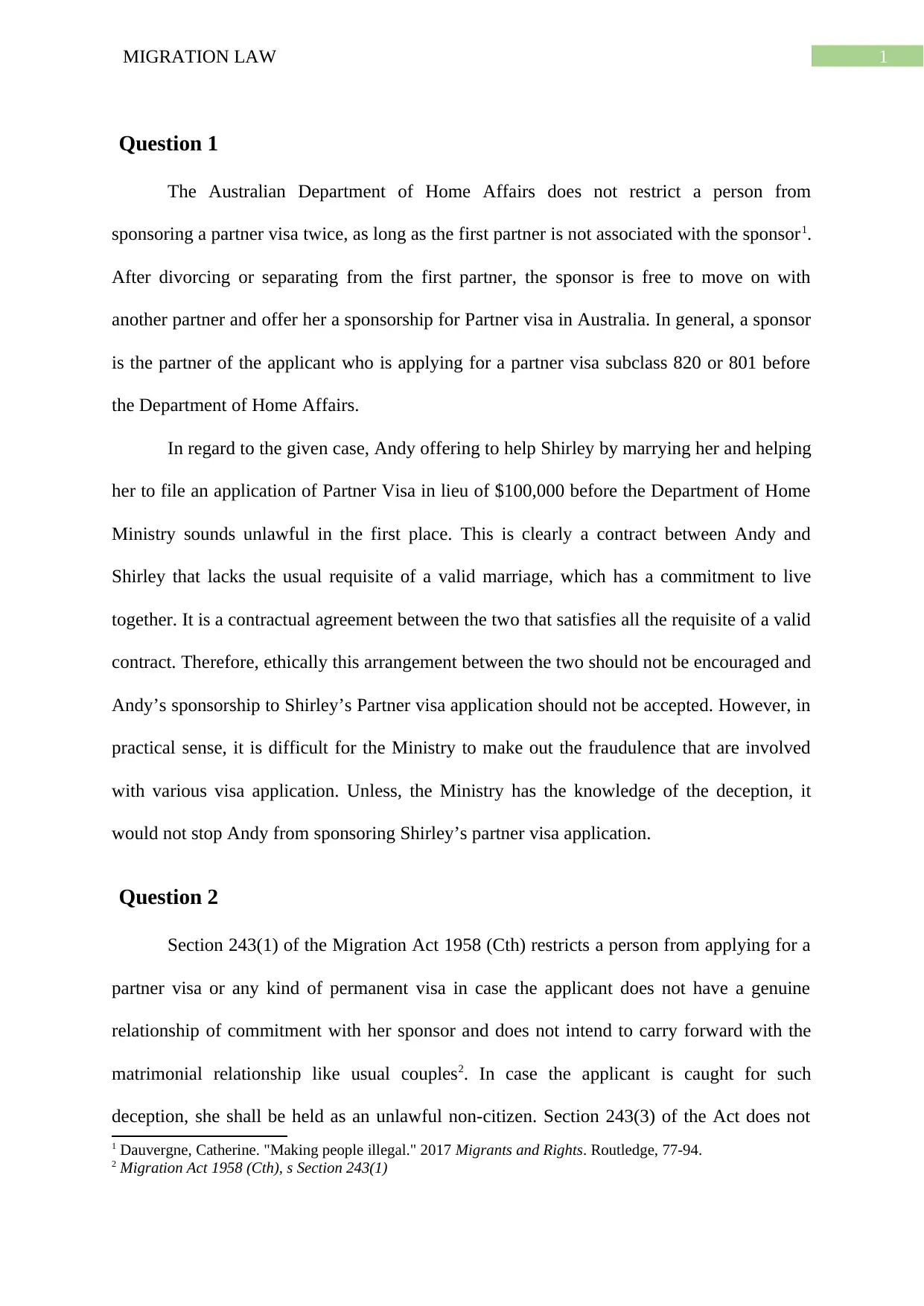
1MIGRATION LAW
Question 1
The Australian Department of Home Affairs does not restrict a person from
sponsoring a partner visa twice, as long as the first partner is not associated with the sponsor1.
After divorcing or separating from the first partner, the sponsor is free to move on with
another partner and offer her a sponsorship for Partner visa in Australia. In general, a sponsor
is the partner of the applicant who is applying for a partner visa subclass 820 or 801 before
the Department of Home Affairs.
In regard to the given case, Andy offering to help Shirley by marrying her and helping
her to file an application of Partner Visa in lieu of $100,000 before the Department of Home
Ministry sounds unlawful in the first place. This is clearly a contract between Andy and
Shirley that lacks the usual requisite of a valid marriage, which has a commitment to live
together. It is a contractual agreement between the two that satisfies all the requisite of a valid
contract. Therefore, ethically this arrangement between the two should not be encouraged and
Andy’s sponsorship to Shirley’s Partner visa application should not be accepted. However, in
practical sense, it is difficult for the Ministry to make out the fraudulence that are involved
with various visa application. Unless, the Ministry has the knowledge of the deception, it
would not stop Andy from sponsoring Shirley’s partner visa application.
Question 2
Section 243(1) of the Migration Act 1958 (Cth) restricts a person from applying for a
partner visa or any kind of permanent visa in case the applicant does not have a genuine
relationship of commitment with her sponsor and does not intend to carry forward with the
matrimonial relationship like usual couples2. In case the applicant is caught for such
deception, she shall be held as an unlawful non-citizen. Section 243(3) of the Act does not
1 Dauvergne, Catherine. "Making people illegal." 2017 Migrants and Rights. Routledge, 77-94.
2 Migration Act 1958 (Cth), s Section 243(1)
Question 1
The Australian Department of Home Affairs does not restrict a person from
sponsoring a partner visa twice, as long as the first partner is not associated with the sponsor1.
After divorcing or separating from the first partner, the sponsor is free to move on with
another partner and offer her a sponsorship for Partner visa in Australia. In general, a sponsor
is the partner of the applicant who is applying for a partner visa subclass 820 or 801 before
the Department of Home Affairs.
In regard to the given case, Andy offering to help Shirley by marrying her and helping
her to file an application of Partner Visa in lieu of $100,000 before the Department of Home
Ministry sounds unlawful in the first place. This is clearly a contract between Andy and
Shirley that lacks the usual requisite of a valid marriage, which has a commitment to live
together. It is a contractual agreement between the two that satisfies all the requisite of a valid
contract. Therefore, ethically this arrangement between the two should not be encouraged and
Andy’s sponsorship to Shirley’s Partner visa application should not be accepted. However, in
practical sense, it is difficult for the Ministry to make out the fraudulence that are involved
with various visa application. Unless, the Ministry has the knowledge of the deception, it
would not stop Andy from sponsoring Shirley’s partner visa application.
Question 2
Section 243(1) of the Migration Act 1958 (Cth) restricts a person from applying for a
partner visa or any kind of permanent visa in case the applicant does not have a genuine
relationship of commitment with her sponsor and does not intend to carry forward with the
matrimonial relationship like usual couples2. In case the applicant is caught for such
deception, she shall be held as an unlawful non-citizen. Section 243(3) of the Act does not
1 Dauvergne, Catherine. "Making people illegal." 2017 Migrants and Rights. Routledge, 77-94.
2 Migration Act 1958 (Cth), s Section 243(1)
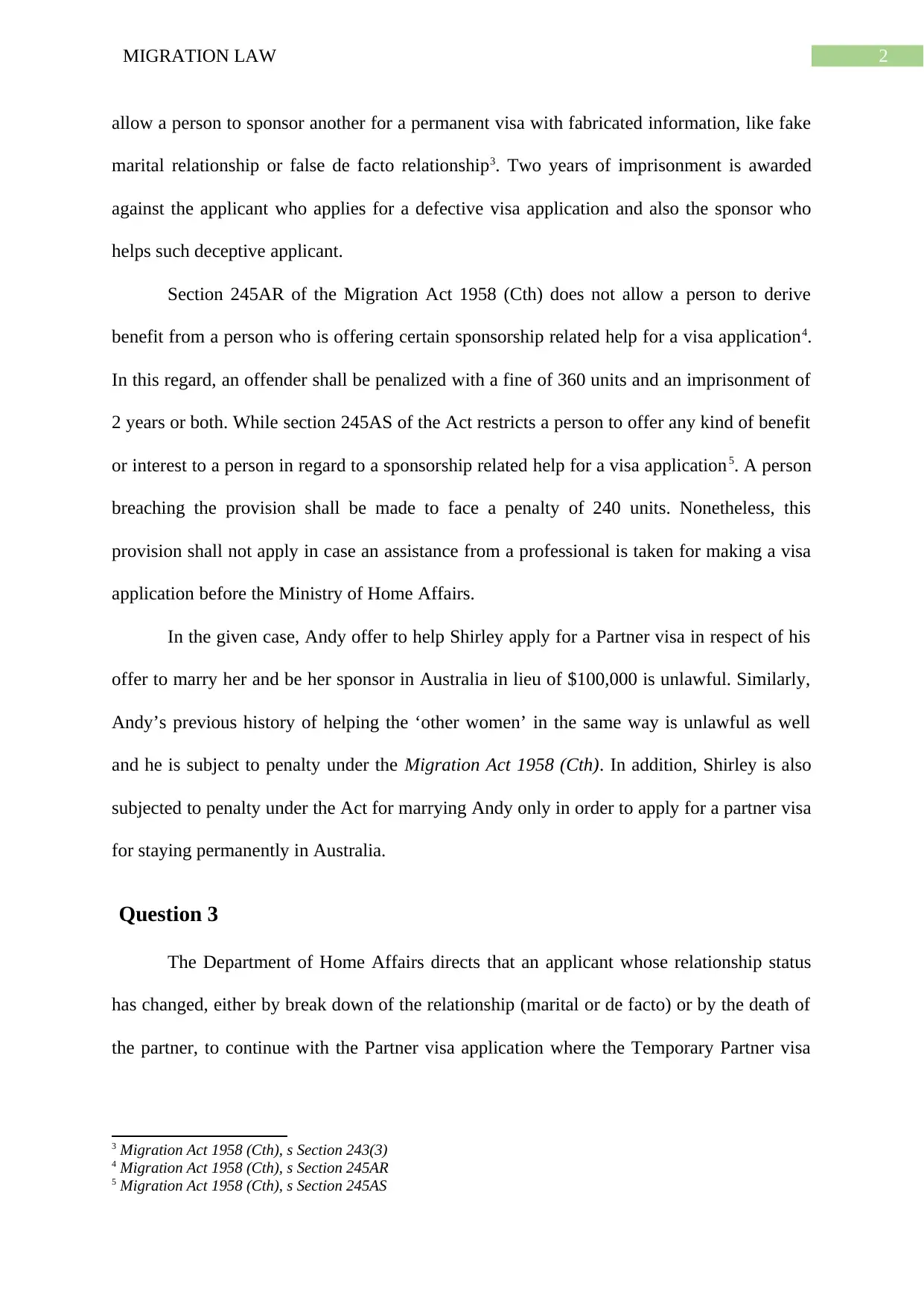
2MIGRATION LAW
allow a person to sponsor another for a permanent visa with fabricated information, like fake
marital relationship or false de facto relationship3. Two years of imprisonment is awarded
against the applicant who applies for a defective visa application and also the sponsor who
helps such deceptive applicant.
Section 245AR of the Migration Act 1958 (Cth) does not allow a person to derive
benefit from a person who is offering certain sponsorship related help for a visa application4.
In this regard, an offender shall be penalized with a fine of 360 units and an imprisonment of
2 years or both. While section 245AS of the Act restricts a person to offer any kind of benefit
or interest to a person in regard to a sponsorship related help for a visa application5. A person
breaching the provision shall be made to face a penalty of 240 units. Nonetheless, this
provision shall not apply in case an assistance from a professional is taken for making a visa
application before the Ministry of Home Affairs.
In the given case, Andy offer to help Shirley apply for a Partner visa in respect of his
offer to marry her and be her sponsor in Australia in lieu of $100,000 is unlawful. Similarly,
Andy’s previous history of helping the ‘other women’ in the same way is unlawful as well
and he is subject to penalty under the Migration Act 1958 (Cth). In addition, Shirley is also
subjected to penalty under the Act for marrying Andy only in order to apply for a partner visa
for staying permanently in Australia.
Question 3
The Department of Home Affairs directs that an applicant whose relationship status
has changed, either by break down of the relationship (marital or de facto) or by the death of
the partner, to continue with the Partner visa application where the Temporary Partner visa
3 Migration Act 1958 (Cth), s Section 243(3)
4 Migration Act 1958 (Cth), s Section 245AR
5 Migration Act 1958 (Cth), s Section 245AS
allow a person to sponsor another for a permanent visa with fabricated information, like fake
marital relationship or false de facto relationship3. Two years of imprisonment is awarded
against the applicant who applies for a defective visa application and also the sponsor who
helps such deceptive applicant.
Section 245AR of the Migration Act 1958 (Cth) does not allow a person to derive
benefit from a person who is offering certain sponsorship related help for a visa application4.
In this regard, an offender shall be penalized with a fine of 360 units and an imprisonment of
2 years or both. While section 245AS of the Act restricts a person to offer any kind of benefit
or interest to a person in regard to a sponsorship related help for a visa application5. A person
breaching the provision shall be made to face a penalty of 240 units. Nonetheless, this
provision shall not apply in case an assistance from a professional is taken for making a visa
application before the Ministry of Home Affairs.
In the given case, Andy offer to help Shirley apply for a Partner visa in respect of his
offer to marry her and be her sponsor in Australia in lieu of $100,000 is unlawful. Similarly,
Andy’s previous history of helping the ‘other women’ in the same way is unlawful as well
and he is subject to penalty under the Migration Act 1958 (Cth). In addition, Shirley is also
subjected to penalty under the Act for marrying Andy only in order to apply for a partner visa
for staying permanently in Australia.
Question 3
The Department of Home Affairs directs that an applicant whose relationship status
has changed, either by break down of the relationship (marital or de facto) or by the death of
the partner, to continue with the Partner visa application where the Temporary Partner visa
3 Migration Act 1958 (Cth), s Section 243(3)
4 Migration Act 1958 (Cth), s Section 245AR
5 Migration Act 1958 (Cth), s Section 245AS
⊘ This is a preview!⊘
Do you want full access?
Subscribe today to unlock all pages.

Trusted by 1+ million students worldwide
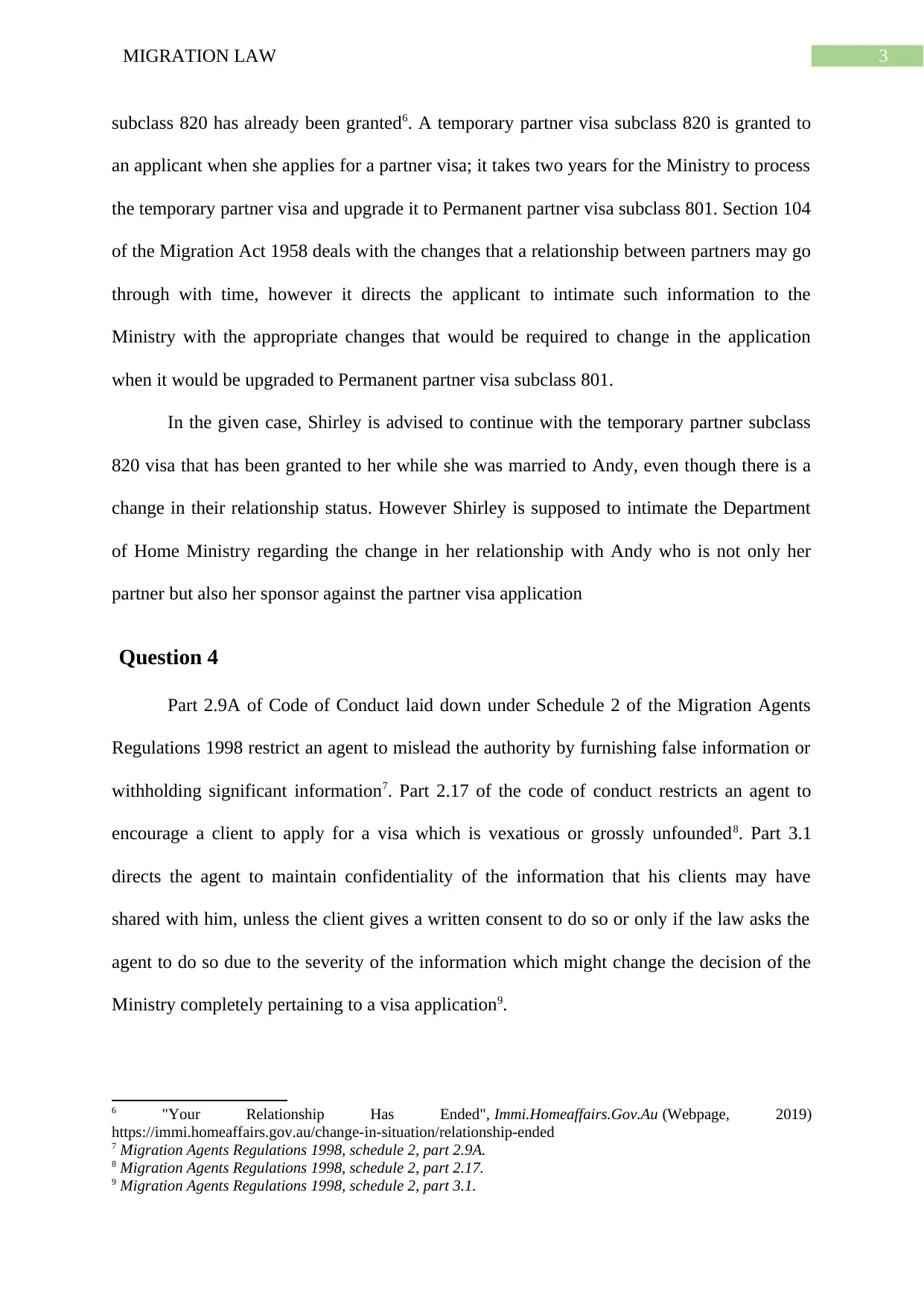
3MIGRATION LAW
subclass 820 has already been granted6. A temporary partner visa subclass 820 is granted to
an applicant when she applies for a partner visa; it takes two years for the Ministry to process
the temporary partner visa and upgrade it to Permanent partner visa subclass 801. Section 104
of the Migration Act 1958 deals with the changes that a relationship between partners may go
through with time, however it directs the applicant to intimate such information to the
Ministry with the appropriate changes that would be required to change in the application
when it would be upgraded to Permanent partner visa subclass 801.
In the given case, Shirley is advised to continue with the temporary partner subclass
820 visa that has been granted to her while she was married to Andy, even though there is a
change in their relationship status. However Shirley is supposed to intimate the Department
of Home Ministry regarding the change in her relationship with Andy who is not only her
partner but also her sponsor against the partner visa application
Question 4
Part 2.9A of Code of Conduct laid down under Schedule 2 of the Migration Agents
Regulations 1998 restrict an agent to mislead the authority by furnishing false information or
withholding significant information7. Part 2.17 of the code of conduct restricts an agent to
encourage a client to apply for a visa which is vexatious or grossly unfounded8. Part 3.1
directs the agent to maintain confidentiality of the information that his clients may have
shared with him, unless the client gives a written consent to do so or only if the law asks the
agent to do so due to the severity of the information which might change the decision of the
Ministry completely pertaining to a visa application9.
6 "Your Relationship Has Ended", Immi.Homeaffairs.Gov.Au (Webpage, 2019)
https://immi.homeaffairs.gov.au/change-in-situation/relationship-ended
7 Migration Agents Regulations 1998, schedule 2, part 2.9A.
8 Migration Agents Regulations 1998, schedule 2, part 2.17.
9 Migration Agents Regulations 1998, schedule 2, part 3.1.
subclass 820 has already been granted6. A temporary partner visa subclass 820 is granted to
an applicant when she applies for a partner visa; it takes two years for the Ministry to process
the temporary partner visa and upgrade it to Permanent partner visa subclass 801. Section 104
of the Migration Act 1958 deals with the changes that a relationship between partners may go
through with time, however it directs the applicant to intimate such information to the
Ministry with the appropriate changes that would be required to change in the application
when it would be upgraded to Permanent partner visa subclass 801.
In the given case, Shirley is advised to continue with the temporary partner subclass
820 visa that has been granted to her while she was married to Andy, even though there is a
change in their relationship status. However Shirley is supposed to intimate the Department
of Home Ministry regarding the change in her relationship with Andy who is not only her
partner but also her sponsor against the partner visa application
Question 4
Part 2.9A of Code of Conduct laid down under Schedule 2 of the Migration Agents
Regulations 1998 restrict an agent to mislead the authority by furnishing false information or
withholding significant information7. Part 2.17 of the code of conduct restricts an agent to
encourage a client to apply for a visa which is vexatious or grossly unfounded8. Part 3.1
directs the agent to maintain confidentiality of the information that his clients may have
shared with him, unless the client gives a written consent to do so or only if the law asks the
agent to do so due to the severity of the information which might change the decision of the
Ministry completely pertaining to a visa application9.
6 "Your Relationship Has Ended", Immi.Homeaffairs.Gov.Au (Webpage, 2019)
https://immi.homeaffairs.gov.au/change-in-situation/relationship-ended
7 Migration Agents Regulations 1998, schedule 2, part 2.9A.
8 Migration Agents Regulations 1998, schedule 2, part 2.17.
9 Migration Agents Regulations 1998, schedule 2, part 3.1.
Paraphrase This Document
Need a fresh take? Get an instant paraphrase of this document with our AI Paraphraser
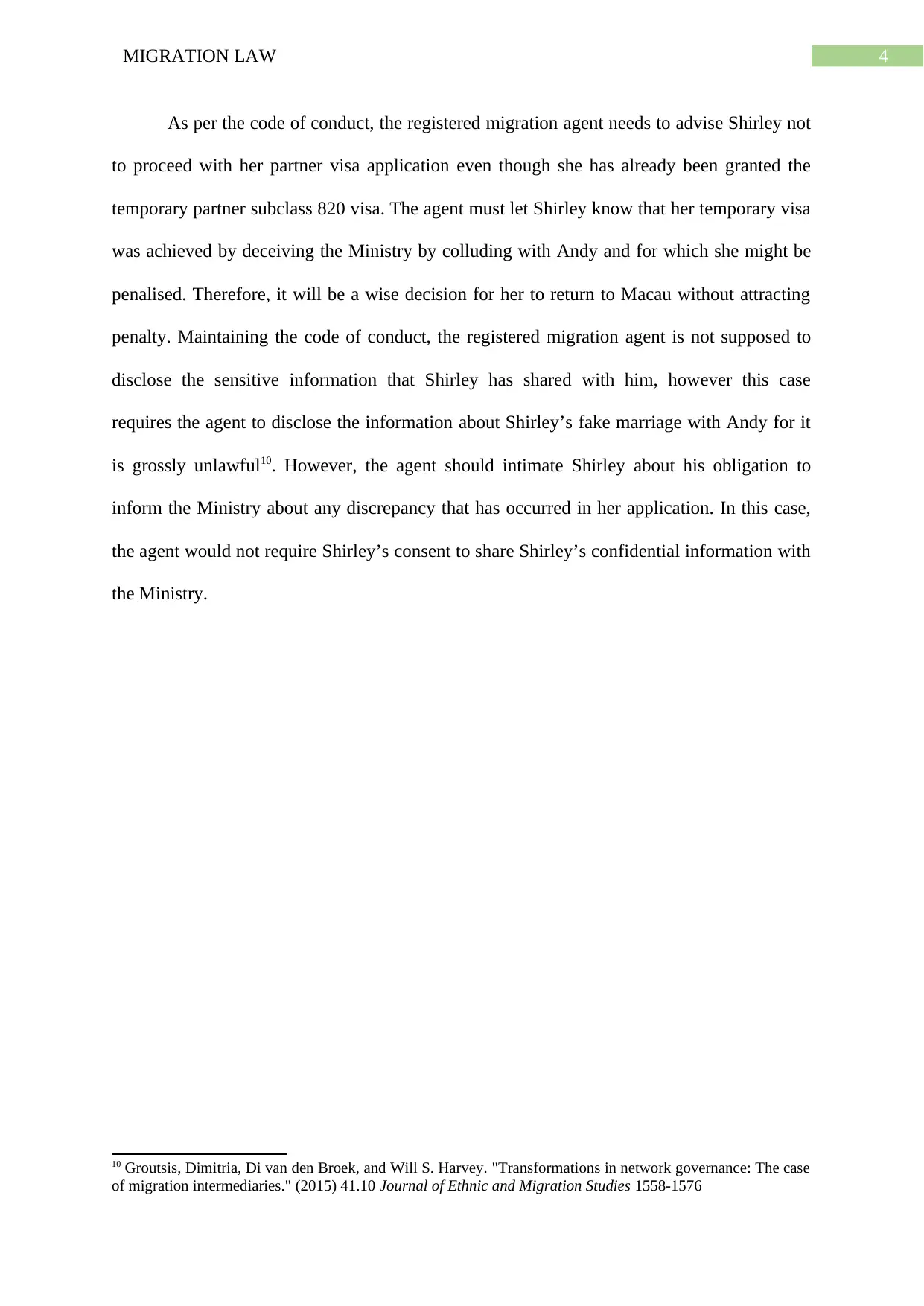
4MIGRATION LAW
As per the code of conduct, the registered migration agent needs to advise Shirley not
to proceed with her partner visa application even though she has already been granted the
temporary partner subclass 820 visa. The agent must let Shirley know that her temporary visa
was achieved by deceiving the Ministry by colluding with Andy and for which she might be
penalised. Therefore, it will be a wise decision for her to return to Macau without attracting
penalty. Maintaining the code of conduct, the registered migration agent is not supposed to
disclose the sensitive information that Shirley has shared with him, however this case
requires the agent to disclose the information about Shirley’s fake marriage with Andy for it
is grossly unlawful10. However, the agent should intimate Shirley about his obligation to
inform the Ministry about any discrepancy that has occurred in her application. In this case,
the agent would not require Shirley’s consent to share Shirley’s confidential information with
the Ministry.
10 Groutsis, Dimitria, Di van den Broek, and Will S. Harvey. "Transformations in network governance: The case
of migration intermediaries." (2015) 41.10 Journal of Ethnic and Migration Studies 1558-1576
As per the code of conduct, the registered migration agent needs to advise Shirley not
to proceed with her partner visa application even though she has already been granted the
temporary partner subclass 820 visa. The agent must let Shirley know that her temporary visa
was achieved by deceiving the Ministry by colluding with Andy and for which she might be
penalised. Therefore, it will be a wise decision for her to return to Macau without attracting
penalty. Maintaining the code of conduct, the registered migration agent is not supposed to
disclose the sensitive information that Shirley has shared with him, however this case
requires the agent to disclose the information about Shirley’s fake marriage with Andy for it
is grossly unlawful10. However, the agent should intimate Shirley about his obligation to
inform the Ministry about any discrepancy that has occurred in her application. In this case,
the agent would not require Shirley’s consent to share Shirley’s confidential information with
the Ministry.
10 Groutsis, Dimitria, Di van den Broek, and Will S. Harvey. "Transformations in network governance: The case
of migration intermediaries." (2015) 41.10 Journal of Ethnic and Migration Studies 1558-1576
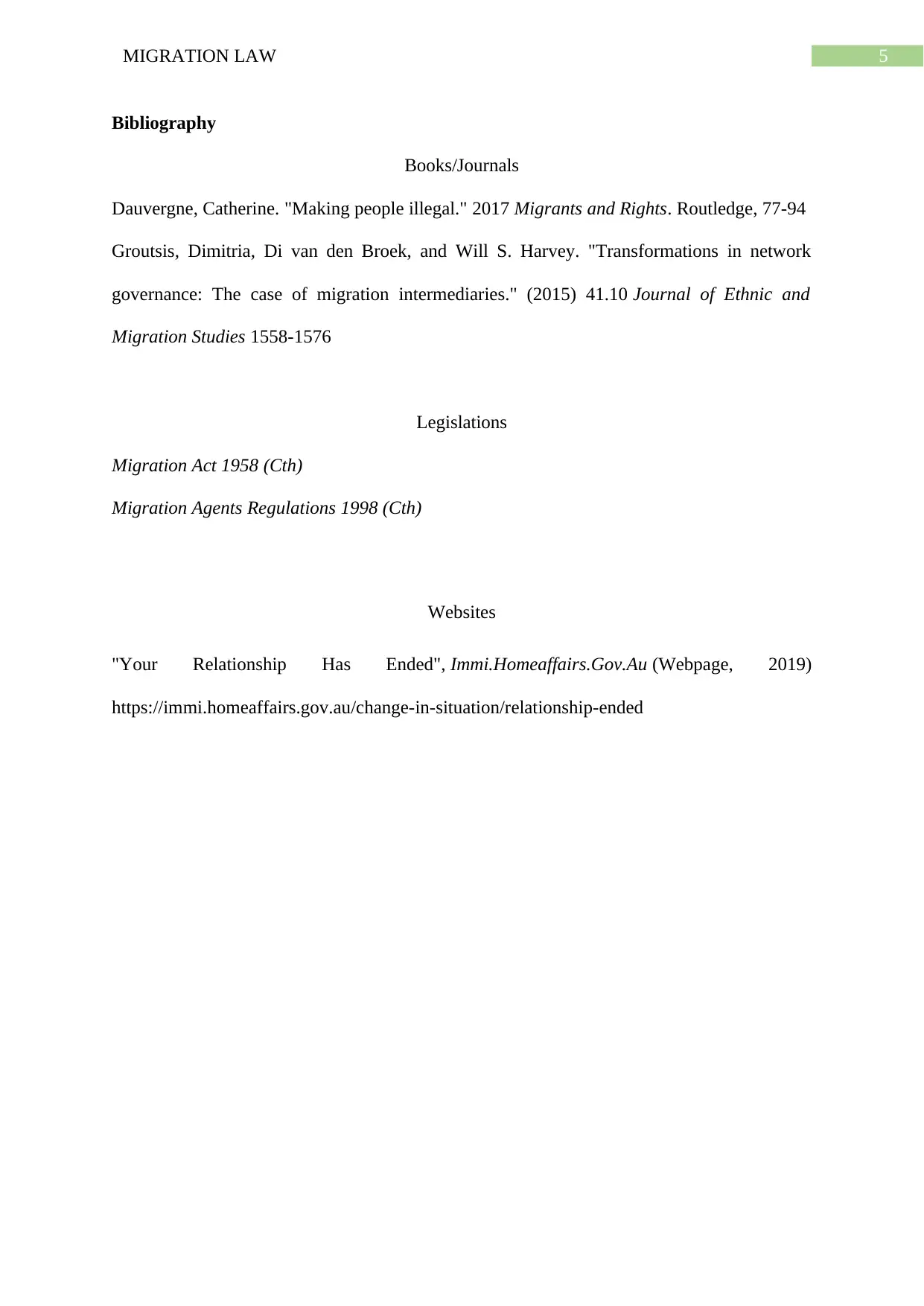
5MIGRATION LAW
Bibliography
Books/Journals
Dauvergne, Catherine. "Making people illegal." 2017 Migrants and Rights. Routledge, 77-94
Groutsis, Dimitria, Di van den Broek, and Will S. Harvey. "Transformations in network
governance: The case of migration intermediaries." (2015) 41.10 Journal of Ethnic and
Migration Studies 1558-1576
Legislations
Migration Act 1958 (Cth)
Migration Agents Regulations 1998 (Cth)
Websites
"Your Relationship Has Ended", Immi.Homeaffairs.Gov.Au (Webpage, 2019)
https://immi.homeaffairs.gov.au/change-in-situation/relationship-ended
Bibliography
Books/Journals
Dauvergne, Catherine. "Making people illegal." 2017 Migrants and Rights. Routledge, 77-94
Groutsis, Dimitria, Di van den Broek, and Will S. Harvey. "Transformations in network
governance: The case of migration intermediaries." (2015) 41.10 Journal of Ethnic and
Migration Studies 1558-1576
Legislations
Migration Act 1958 (Cth)
Migration Agents Regulations 1998 (Cth)
Websites
"Your Relationship Has Ended", Immi.Homeaffairs.Gov.Au (Webpage, 2019)
https://immi.homeaffairs.gov.au/change-in-situation/relationship-ended
⊘ This is a preview!⊘
Do you want full access?
Subscribe today to unlock all pages.

Trusted by 1+ million students worldwide
1 out of 6
Related Documents
Your All-in-One AI-Powered Toolkit for Academic Success.
+13062052269
info@desklib.com
Available 24*7 on WhatsApp / Email
![[object Object]](/_next/static/media/star-bottom.7253800d.svg)
Unlock your academic potential
Copyright © 2020–2026 A2Z Services. All Rights Reserved. Developed and managed by ZUCOL.




